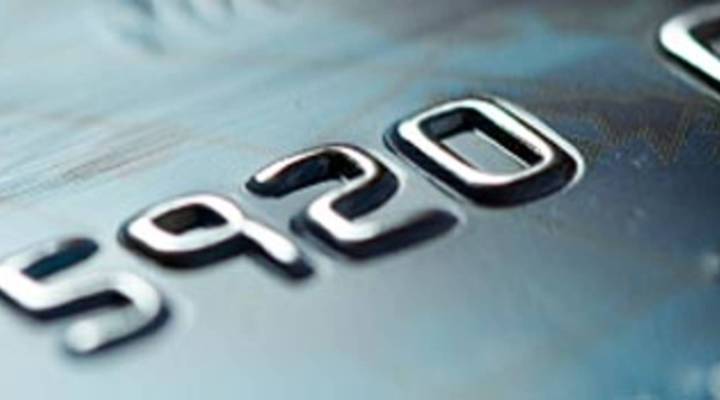
Are hackers ahead of card security?

TEXT OF INTERVIEW
Tess Vigeland: So how does a fraud happen on such a massive scale? Well, basically, the thieves figured out some security algorithm that was being used by a credit-card processing company. And they used that information to swipe numbers from five major retailers, including 7-Eleven. The fraud involves an American suspect based in Miami and Russian accomplices.
For a look at how and why these massive thefts continue despite the best efforts of law enforcement, we turn to Ted Crooks. He’s vice president of Global Analytics and helps banks come up with solutions to credit fraud problems. Thanks for talking with us.
TED CROOKS: My pleasure.
VIGELAND: Where was the failure here? Consumers, retailers, banks, some sort of middle man?
CROOKS: It’s a shared responsibility because the payment system is like a giant refinery, with tubes and pipes and valves everywhere. And you are going to get leaks occasionally, and the system has to be built so it can withstand some of those leaks. And this is one case where a leak got completely out of control.
VIGELAND: So who takes the hit here? Who loses their shirt? Consumers really aren’t held responsible, right?
CROOKS: Generally not. Under rare conditions a financial institution might try to pin it on a consumer, especially on a debit card because they’re not as protected as credit cards. But in general, 99.99 percent of the loss will go to credit-card issuing banks.
VIGELAND: Is it true that banks and these payment-gateway systems that we’re hearing about, that they have access to technology that could prevent this but they don’t always use it?
CROOKS: Well, that’s a little self-serving for me to answer that because that’s the kind of stuff that I build, and our company does. Yes, there is always more technology that could be supplied. And much of it, of course, I think would be very worthwhile. But banks have to judge is that extra bit of technology going to really save enough money to make it worthwhile. The fraudsters will no doubt adapt around it eventually. So this is a never-ending arms race. Also if one bank gets ahead of the next bank, well then that other bank will catch up as well, and they all end up at parity again. They’re more concerned how they stand with competition than the absolute amount of fraud.
VIGELAND: I’ve read that European credit cards actually have more protections than those in the U.S. Why is that?
CROOKS: Yes, the cards are more secure, but it’s caused a bigger fraud problem. The UK, for example, shifted over to a secure, chip-based card that has an integrated circuit in the card and requires a PIN number anytime you use it. The electronics is very secure. But actually fraud has gone up substantially as a consequence of implementing it. And the reason was even though the fraud is more difficult, it’s now more valuable. Because the same PIN you use to buy gas at a gas station you use to get cash out of a ATM.
VIGELAND: You know, is this kind of thing simply a fact of life at this point? Are we going to look back in a few years and say 130 million credit cards, child’s play?
CROOKS: Well, it’s actually much less serious than it was sometime back. About 15 years ago, fraud was much worse than it is now. Better technology was brought to play and has reduced fraud, and now it’s starting to creep back up. And these compromises are only one aspect of it. It’s a serious problem for the industry and for economic policy makers, but it’s not really a big threat for individual card holders.
VIGELAND: I guess even if consumers shouldn’t be losing sleep at night, the advice remains check your credit reports as often as you can.
CROOKS: Well, the big thing is if you’re really worried about it, use your credit card more often than your debit card. If you can keep your balance down and pay it off every month, a credit card is safer. And secondly, do keep track of your bills first. Look at those bills you get from the card company and make sure that there’s nothing on there you don’t recognize. And then check your credit report. And you can do that three times a year for free.
VIGELAND: All right, excellent advice. Ted Crooks is vice president of Global Analytics. Thanks so much for joining us.
CROOKS: My pleasure.
There’s a lot happening in the world. Through it all, Marketplace is here for you.
You rely on Marketplace to break down the world’s events and tell you how it affects you in a fact-based, approachable way. We rely on your financial support to keep making that possible.
Your donation today powers the independent journalism that you rely on. For just $5/month, you can help sustain Marketplace so we can keep reporting on the things that matter to you.












